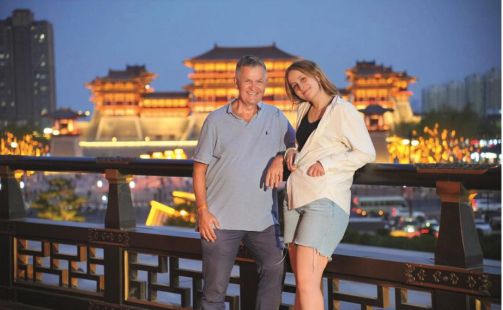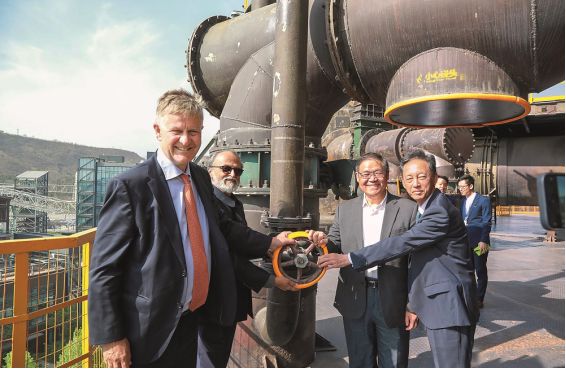On an early autumn morning in Beijing, when the reporter of Global People met Erik Solheim, he had just finished a nearly one-hour jog by the river, his shirt front soaked with sweat.
"Ten years ago, I definitely wouldn't run in Beijing. The reason is probably obvious to everyone, the smog. But now, it's completely different," Solheim said as he walked with the reporter along the Yongding River Canal, just outside Yuyuantan Park.
Amid the city's green corridors, the vibrant blue sky and crystal-clear river water blended harmoniously, Solheim occasionally stopped to take photos.
Since his first visit to China in 1984, Solheim has witnessed the tremendous changes in the country's ecological environment. After stepping down as Under-Secretary-General of the United Nations and Executive Director of the UN Environment Programme in 2018, he redirected his focus more toward China, aligning himself with the global trend of low-carbon development.

·Solheim was interviewed by Global People Magazine in Beijing In October 2024.
Becoming the "Uncle Sol" to Chinese Netizens
"Have you ever been to Niushou Mountain in Nanjing?" Before the interview even began, as soon as he sat down, Solheim eagerly took on the role of a "tour guide."
This summer, he was struck by the breathtaking scenery at Niushou Mountain. At the summit, shrouded in mist, the "Usnisa Palace" stood like a celestial palace, isolated from the world. Young people dressed in Tang suits and traditional Hanfu strolled through, creating the feeling of a "time-travel" experience. "You don't need to convert to Buddhism to appreciate its beauty. Almost everyone who visits there seems to transform into an artist."
Fascinated by Chinese history and culture, Solheim took his son, Oxen, to Qufu, the hometown of Confucius, in Shandong province to pay respects last year. This year, he brought his daughter, Sophie, to Yixing in Jiangsu province to enjoy tea culture and to the Shaolin Temple in Henan to experience Meditation.

·Solheim and his daughter Sophie in Luoyang, Henan province, during the summer of 2024.
For Solheim, Norway's first nation-building occurred over 1,000 years ago, while China had already experienced the glory of the Tang and Song dynasties. "In China, you can not only witness natural beauty but also immerse yourself in a long, rich history and culture. It's incredibly inspiring," Solheim said.
Solheim's initial interest in China stemmed precisely from his "lack of understanding" about the country. In the 1980s, most Europeans knew very little about China, which sparked his curiosity about this ancient Eastern nation.
He recalled that when he first visited China in 1984, Beijing looked vastly different from today—there were no skyscrapers, no private cars on the roads, and everyone rode bicycles. People dressed simply, and the food was plain. "China's complete transformation in its economy came from the Reforms and Opening-up policies introduced by Deng Xiaoping. For a long time, the focus was entirely on the economy—how to lift people out of poverty was the urgent goal to achieve."
In the decades that followed, Solheim witnessed China's tremendous economic growth and the significant improvement in the well-being of its people.
Solheim was particularly pleased to see that, alongside becoming the world's second-largest economy, China is also taking on a leadership role in global green development.
He highlighted China's achievements in this field: "China is building the world's largest national park system, it leads the world in afforestation project, and it is one of the top countries globally in green technologies such as electric vehicles, solar energy and wind power." "When it comes to the scale of green development, no country can match China. If we want to help the world move toward a 'green' future, China is indispensable," Solheim said. And this, he added, is why he has visited China so frequently.
During the interview, there was a Chinese map in the room. Although Solheim doesn't speak Chinese, he was able to accurately identify most of the provinces on the map. Except for Tibet, Qinghai, Ningxia, and Jiangxi, he has traveled to every other province and autonomous region in China.
In 2020, Solheim opened Weibo account and WeChat official account, where he was affectionately dubbed "Uncle Sol" by Chinese netizens. Today, tens of thousands of followers across the internet join this Norwegian "uncle" in witnessing the progress of China's ecological and environmental governance.
"A Dreamlike Transformation"
"Almost every European city has gone through the process of industrial pollution. It took them four to five decades to regain clean air and clear rivers, but China achieved this in just 10 years." Behind this achievement, Solheim is fully aware of the tremendous efforts China has put in.
The Hobq Desert in Inner Mongolia is a place Solheim has visited many times. From vast yellow sands to lush greenery, from the "Sea of Death" to an "Economic Oasis," the "green miracle" that has taken place here astonishes him. Through hard work and innovative solutions, Hobq has not only improved its desert environment but has also found opportunities for economic growth and poverty alleviation. Solheim observed that local people attempted to growing Chinese medicinal herbs in the desert, installing solar panels, and developing Eco-tourism. "It is one of the greatest 'green miracles' in the world."
Another "remarkable transformation" that left a strong impression on Solheim took place in Zhejiang.
In some villages in Jinhua, Zhejiang Province, factories once dominated the landscape, and pollution was severe. Some rivers had become so polluted that the media referred to them as "milk rivers." In recent years, the city has shut down polluting factories, improved the living environment in villages, and developed the local home-stay tourism industry. Solheim said that when he compared old photos of the pollution with the scene in front of him—elderly people walking through the fields, young people swimming in the rivers, newly constructed apartment buildings standing clean and orderly, and a steady stream of tourists—it was nothing short of a "dreamlike transformation."
In addition, the transformation of the Shougang Industrial Park in Beijing and the shift of Zibo, a major chemical industry hub... Solheim has observed that, with the momentum of green transformation, more and more regions are finding new pathways for green development, achieving a win-win situation for both economic growth and environmental protection. "This transformation is wonderful. Not all governments have the same level of execution as the Chinese government. Other countries should come to China more often and draw inspiration from China's green development."

·Solheim visited Shougang Industrial Park in Beijing in April 2023.
In June this year, Solheim visited Urumqi in Xinjiang. The scene in front of him felt like stepping into the future: in the boundless desert stood the world's largest single photovoltaic project, with an installed capacity of 4,000 megawatts.
What does 4,000 megawatts mean?
Solheim explained that this is almost equivalent to the entire annual electricity consumption of Nigeria, Africa's most populous country. While in Urumqi, he also visited Goldwind, the global leader in wind energy. The company's wind power generation is four times the total wind power output of Norway.
Solheim is inspired by China's strong commitment to promoting green technologies on a large scale. According to data from China's National Development and Reform Commission, China has been the world's largest producer of photovoltaic modules for 16 consecutive years, supplying 70% of the world's photovoltaic modules and 60% of wind power equipment. In the first half of 2024, the market penetration rate of new energy vehicles in China reached 35.2%, ranking first among major economies. However, despite these tremendous contributions to the world, some Western countries view them as "obstacles" and even label them as "overcapacity."
In response, Solheim said, "Why has the United States been the dominant global power for the past 100 years? Because its scale is big enough. Whether it's the iPhone produced by Apple or the cars made by General Motors, both far exceed the demand of the U.S. domestic market. When China achieves the same in green technology, they should applaud rather than be envious."
Solheim recalls that more than a decade ago, when he attended climate change conferences with Western leaders, the common refrain was always, "We need more green products and we must support the development of green products." Yet, when China started producing these products, those same Western leaders changed their tune. " Ultimately, this is a reflection of the West's lack of confidence," Solheim said. He understands the Western mindset—they fear that people in their own countries will lose jobs. However, instead of complaining, it's better to take action, and pursue innovation and green competition, rather than resort to protectionism.
"A Win-Win Deal"
Unlike his current lifestyle, which takes him flying all over the world, Solheim rarely traveled abroad when he was young. In his hometown of Oslo, the natural environment was so comfortable that he once felt he needed nothing more.
"When I was a student, I spent almost every summer in the mountains, running after sheep in the forests, and sometimes having close encounters with elk or foxes," Solheim said. Although he later saw more beautiful and pristine natural landscapes in other countries, the high ecological standards of his hometown gave him an inherent sense of responsibility to protect the environment.
In 2005, at the age of 50, Solheim became Norway's Minister of Environment and International Development. From then on, he dedicated the second half of his career to the "green cause." He initiated the global rainforest conservation program and was behind several far-reaching pieces of national legislation, including the Biodiversity Act and laws to protect the urban forests of Oslo. For his contributions to climate and environmental issues, he was awarded the "Champions of the Earth Award" by the United Nations Environment Programme. In 2009, he was named a "Green Hero" by Time magazine. After concluding his work in Norway in 2016, Solheim became the Under-Secretary-General of the United Nations and Executive Director of the UN Environment Programme, expanding his efforts to promote green development on a global scale.
Solheim doesn't fight this battle alone. His family is like a "green professional team." His wife, Guri, has spent the past few years working on marine environmental protection. His son, Aksel, is involved with the Young Greens of Norway. His daughter, Sofie, is also deeply concerned about climate and environmental issues.
For his contributions to advancing China's green development, Solheim was awarded the 2023 Chinese Government Friendship Award on February 4. As he has grown closer to China, however, he has also faced some malicious criticism. "Sometimes people criticize me, saying that I'm too friendly toward China. However, I tell them, China's civilization is thousands of years older than the United States, and its population is four times that of the U.S. Over the past few decades, China has achieved unprecedented economic success. Cities like Hangzhou, Shenzhen, and Guangzhou have become some of the most modern and beautiful in the world. I tell my American or European friends that seeing is believing, come and see for yourselves the incredible changes taking place in China!"
Solheim said that, of course, he also gives similar advice to his Chinese friends, encouraging them to learn more about the United States. After all, for nearly 200 years, the U.S. has been the center of global scientific and industrial development. "We all need to learn from and collaborate with each other. However, today, there are more areas where the West should learn from China and seek cooperation."
Solheim has also been an experienced peace negotiator. From 1998 to 2005, he served as the chief mediator in Sri Lanka's peace process. Additionally, he contributed to peace efforts in Sudan, Nepal, Myanmar, and Burundi. "I hope to remain a voice of reason, striving to advocate for cooperation between China and the West," he said. "In fact, all the thorny issues the world is facing today, including those in Ukraine, Gaza, and Sudan, can be resolved through cooperation."
Solheim believes that, in other fields, relations between countries may resemble a game of ping-pong, with winners and losers. But in the field of environmental protection, it's different—it's bound to be a win-win situation. "It's not impossible to set aside differences," he said. "I am pleased to see Chinese companies making more and more investments and fostering cooperation. BYD is investing in Turkey and Brazil, and CATL is investing in Hungary... We need more of such investments. If Western countries can respond positively to China's green development, China can also promote the global green transition through more investments, cooperation, and dialogue. I firmly believe this will be a win-win deal."
 Editor:Chen Jiali
Editor:Chen Jiali